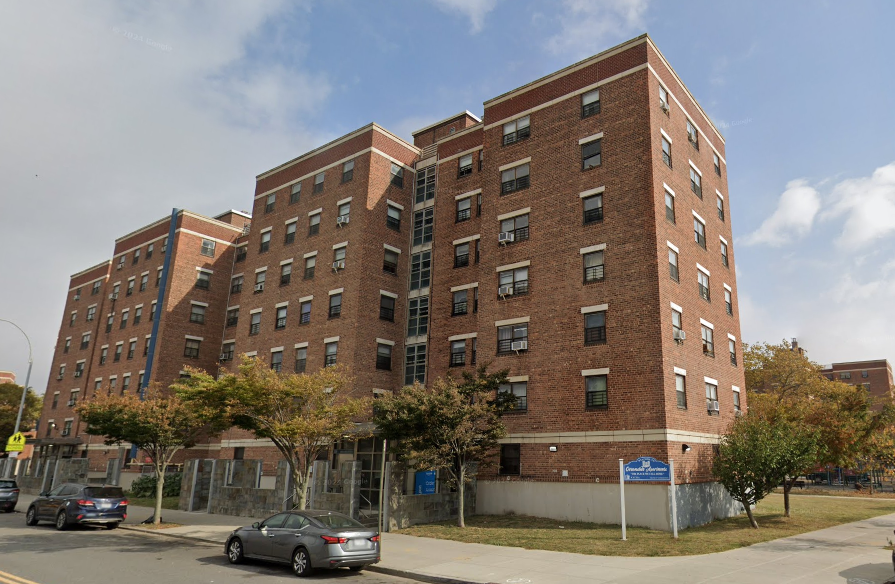Eviction rates at New York City Housing Authority (NYCHA) properties under the Permanent Affordability Commitment Together (PACT) program decreased slightly in Queens in 2024, bucking a citywide trend that saw eviction rates spike significantly elsewhere in New York.
A recent audit by NYC Comptroller Brad Lander found that eviction rates at PACT properties tripled in 2024 and resemble citywide eviction rates in private properties.
The PACT program, designed to address decades of underfunding and disrepair in public housing, transfers some management responsibilities to private and non-profit partners to secure funding for critical renovations, aiming to address an estimated $80 billion shortfall in NYCHA’s capital needs.
However, the Comptroller’s recent audit found that eviction filings and executions at PACT properties occurred at a faster pace than at other NYCHA developments throughout the city and now resemble citywide eviction rates in private rental units.
Evictions in PACT properties rose from 29 in 2023 to 91 in 2024—a staggering increase of over 300%. This brought the eviction rate at PACT properties to 0.57%, up from 0.18% last year, nearly matching the 0.60% rate in private rental units. In contrast, eviction rates at standard NYCHA properties increased from 0.01% to 0.12% during the same period, rising from 15 to 180 evictions.
In Queens, however, the eviction rate decreased slightly in 2024 compared to 2023. NYCHA’s Ocean Bay Apartments development in the Rockaways, the only Queens-based NYCHA development to convert to PACT, saw evictions drop from 10 to eight in 2024, a drop of 20%.
Eviction rates spiked in all other boroughs containing PACT developments, jumping from seven evictions to 55 in Brooklyn, from 4 to 12 in Manhattan and from eight to 16 in the Bronx. A total of 87 NYCHA developments have converted to PACT, with none located in Staten Island.
However, eviction filings at Ocean Bay Apartments, which consists of 28 residential buildings, have been rapidly increasing in recent years, according to the Comptroller’s audit.
The audit highlighted that there were 33 filings in 2021, rising to 66 in 2022 and rising again to 153 in 2023, a staggering 363% rise across the three-year period. The Comptroller’s report included no data for eviction filings in 2024. Elsewhere in the city, filings rose at an even greater pace, jumping from 57 to 867 in Brooklyn across the same period as well as jumping from four to 181 in Manhattan and from 38 to 313 in the Bronx.
The 153 eviction filings at Ocean Bay Apartments represented roughly 10% of the 1,514 eviction filings registered in PACT properties across the city in 2024.
The audit, which was released on Dec. 18, also criticized NYCHA for failing to ensure that PACT property managers adhered to pre-eviction outreach protocols and tenant protections. Auditors found that managers did not consistently make multiple attempts to contact tenants at risk of eviction, inform them of potential financial assistance, or use on-site social service providers to engage with residents. Additionally, managers often failed to establish repayment agreements or report all eviction-related activities, hindering NYCHA’s ability to oversee compliance.
Lander said that NYCHA must do more to ensure that PACT operators follow standard procedures and provide adequate support to tenants.
However, the audit acknowledged some positive steps taken by NYCHA, such as increasing resident involvement in the PACT process. NYCHA representatives now meet with tenants to explain the program and discuss community needs before renovations begin.
In response, a NYCHA spokesperson defended the program, highlighting its success in investing $7 billion to redevelop and renovate public housing units since its inception.
“This unprecedented investment demonstrates our commitment to improving living conditions for NYCHA residents,” the spokesperson said.
The spokesperson added that the Comptroller’s audit does not take NYCHA’s financial and operational challenges into account. The audit only provides a “superficial assessment” of the program while making no substantive recommendations. They also described PACT as “one of the most successful” long-term strategies for preserving crucial affordable housing stock.
The fact remains that there have been very few evictions under PACT, and the program upholds resident rights and protections and provides households with ongoing social services and financial assistance to resolve existing rental arrears. NYCHA and its PACT program undoubtedly prioritize keeping New Yorkers housed, and any suggestion otherwise is misguided and false.
NYCHA officials also told QNS that the integrity of NYCHA buildings will continue to decline without the assistance of the PACT program. Officials noted that 24,000 homes have been converted to the program to date, with repairs made to over 11,000 homes. NYCHA’s stated goal is to convert 62,000 units to PACT by 2028.
Officials also contended that they made efforts throughout the audit process to provide the Comptroller’s team with additional information but said the feedback was not reflected in the final document, stating that the authority is “concerned” by the lack of context provided about resident rights and protections provided by the PACT programs. They noted that all PACT sites are protected by both federal and local protections under the program.




































